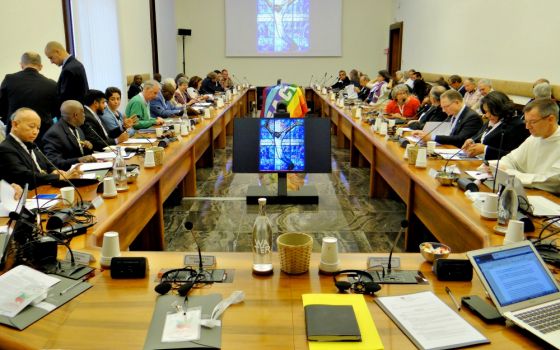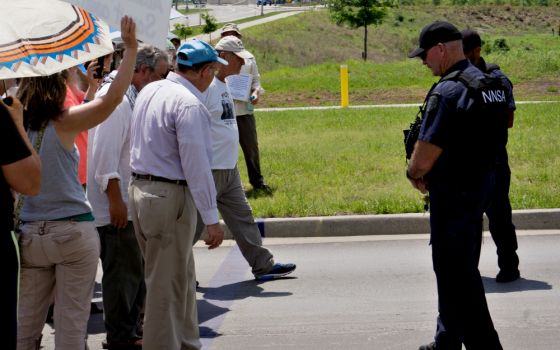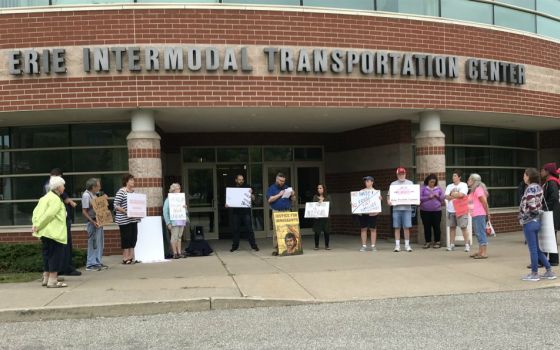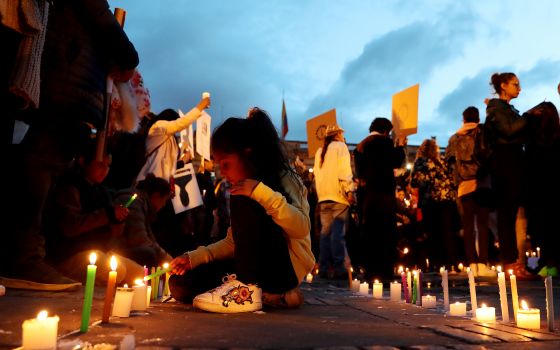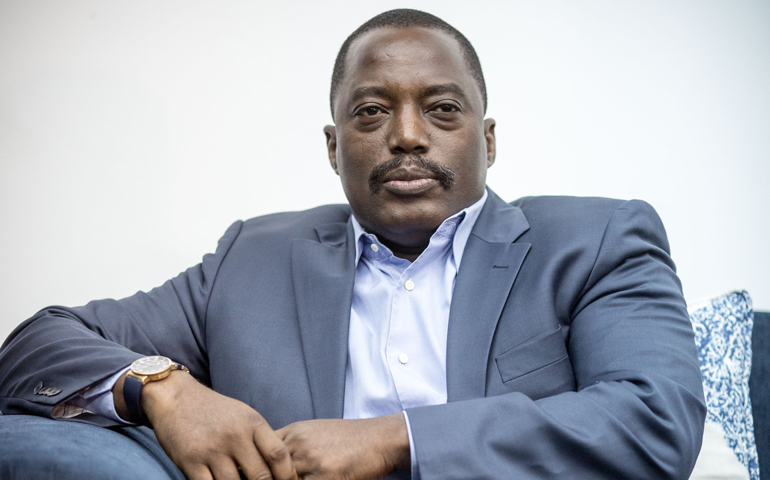
Congolese President Joseph Kabila is seen in Kinshasa Feb. 19, 2015. (CNS photo/Michael Kappeler, EPA)
When government and opposition representatives in the Democratic Republic of Congo, Africa's most Catholic country, sat down for talks in late August, they could thank church leaders for helping bring them together.
With tensions running high and some key politicians still holding back, it's uncertain whether the initiative will succeed in restarting a political process between supporters and opponents of President Joseph Kabila. The Catholic church's involvement has been welcomed by Western governments. Most agree it offers the best chance of peace for a generation in the long-troubled Congo.
"We've presented our peace initiative to the United States and European Union, as well as to United Nations officials, and they're all supporting our church's efforts to stop a descent into disorder," Msgr. Leonard Santedi Kinkupu, secretary-general of the Congo's bishops conference, told NCR. "All sides have welcomed our efforts and seem absolutely ready to hear the Catholic church's voice. Though these are still small steps, with many obstacles ahead, we have to be optimistic."
Up to six million people have died in two decades of war and conflict in the Congo, formerly Zaire, where armed groups, some based in neighboring countries, have exploited a lack of stable government to plunder the rich and plentiful natural resources.
After helping overthrow Mobutu Sese Seko, the country's 32-year dictator, in 1997, Kabila succeeded his father as head of state in 2001 with backing from Western governments and regional allies such as Angola and South Africa. He went on to claim victory in the 2006 and 2011 elections, but opposition parties have accused the 45-year-old president of corruption, involving contracts and deals with foreign mining companies.\
More recently they've charged Kabila with seeking to keep power when his final mandate ends this year; and with elections due this November, they were enraged when the Congo's National Electoral Commission announced that delays in voter registration meant a ballot could not now be organized.
With the Catholic church's involvement, there are hopes that full negotiations, sponsored by the U.N. and African Union, can soon get started -- if the Kabila government agrees to opposition demands for freeing political prisoners, returning seized media and stopping the harassment of opposition politicians.
"Both sides appear to be listening -- and the ruling majority does seem to be taking these preconditions seriously," Santedi Kinkupu assured NCR. "For their part, the bishops are doing everything to save the country, at a time when the lack any consensus risks igniting violent confrontations. We're encouraged by the confidence shown in us by the main political actors, and their readiness to cooperate."
Yet deep uncertainties remain.
The Catholic church's six archdioceses and 41 dioceses make up around half the 79 million inhabitants of the Congo, and run an extensive network of hospitals, clinics and farms, as well as around half of all schools.
The peace initiative was launched by Archbishop Marcel Utembi Tapa of Kisangani, newly elected bishops' conference president, during a mid-August meeting attended by opposition presidential candidate Etienne Tshisekedi and the African Union's mediator, Edem Kojo, a former prime minister of Togo. However, Radio France International cautioned that "pacification measures" by the government also remain a key sticking point, along with the choice of negotiators, while opposition leaders have accused Kojo of siding with Kabila.
Lasting peace will require reining in the Congo's many armed groups, especially in its eastern territories, where an M23 rebel movement signed a U.N.-brokered peace deal in December 2013. Rival militias have continued to carry out massacres, sparking revenge brutalities by government troops.
In mid-August, Pope Francis deplored the "shameful silence" mass killings "perpetrated for a long time" in the Nord-Kivu province. In the latest of a series of atrocities, Islamist rebels from Uganda were accused of killing at least 50 civilians near Beni on Aug. 13.
Taking up the pontiff's appeal, the Congo's Catholic bishops lamented how the shocking incident had "rekindled inconsolable grief" and demanded that their country's rulers "do everything in their power to stop the cycle of atrocities" and identify the perpetrators. They also urged the U.N.'s peacekeeping force, MONUSCO, to do more to find "a lasting solution to the tragedy," and pleaded with the international community to offer stronger support.
Peace and stability in the Congo, one of Africa's largest countries, could play a key role in stemming disorder elsewhere, and in staunching the Islamist insurgencies which have swept across the continent in the last five years -- from Francophone Mali, Burkina Faso and Ivory Coast, to Anglophone Nigeria, Tanzania and Kenya.
In one long-troubled state at least, the Central African Republic, conflict between mostly Christian and Muslim groups is now easing -- thanks to a peaceful election in February and a conciliatory visit by the pope last November. This may help explain why the U.N., African Union and Western governments have been keen to give the Catholic church's latest peace plan in the Congo a try.
In a plenary statement this June outlining the initiative, the bishops' conference said it was ready to use the "capital of trust" placed in the church at a time when the whole country risked being "plunged into chaos." However, it added that it would also "safeguard the church's liberty and neutrality against any form of co-optation," and not "promote any ideology or sponsor anyone in gaining or maintaining power."
Congo's bishops have spoken out before.
Related: Church in Congo criticizes West for failing to stop abuse of resources (Oct. 10, 2016)
Last September, they condemned the failure of Western governments to stop the "illegal, clandestine, irrational and irresponsible exploitation" abuse of their country's resources and demanded "defensive actions" to curb the paradox between its natural wealth and "the crying poverty endlessly accruing in its population."
In May 2015, they deplored the failure of the U.N. to act against "genocide, jihadist fundamentalism and Balkanization" in their country, painting a grim picture of villages burned with impunity and local inhabitants left in "famine and misery," at the hands of criminals wielding "machetes, knives and axes."
The bishops added that the Kabila government risked being viewed as an accomplice in the violence, by responding to the "decaying situation" with "ambiguities, conflicting statements and paradoxes."
"The violence in the east has reached an untenable intensity close to breaking-point, as the killers dream up and implement ever crueler practices. ... These are true acts of genocide, war crimes and crimes against humanity," the bishops said in a pastoral message. "All of this is taking place in the context of an economic mafia and political-military corruption, supported by pillaging on a grand scale of our abundant natural resources in minerals, forestry, wildlife and petroleum. ... The population of the east has the net impression it is unprotected by its own state and abandoned by the international community."
This time too, the bishops' resolution is sure to be tested.
The Catholic church has itself been targeted by armed groups in the Congo. In 1996, rebels murdered the Catholic archbishop of Bukavu in Nord-Kivu, Msgr. Christophe Munzihirwa, while clergy and aid workers in the region have also been attacked. In mid-August, a Caritas accountant from the Basankusu diocese was robbed and killed in Equateur province, while three other Caritas staffers were abducted by suspected Hutu rebels near Mweso and only freed thanks to a sweep by U.N. forces.
Some key opposition groups have so far refused to take part in the talks, and summoned a national strike on Aug. 23, the day they opened. With the death-toll continuing, coupled with a new outbreak of cholera, the population of Nord-Kivu has protested government inaction and threatened to take the law into its own hands.
U.N.'s secretary-general, Ban Ki-Moon, has vowed to monitor the latest talks closely with a view to ensuring "peaceful, credible, inclusive, transparent and timely presidential and legislative elections," while the head of Congo's much-criticized Electoral Commission, Corneille Naanga, has promised a new electoral timetable and praised the church's contribution. So has Kodjo, the African Union's Togolese facilitator, who debated the crisis at length with Utembi and other church intermediaries during the mid-August meeting in Kinshasa's Grand Hotel.
Santedi Kinkupu, the bishops' conference secretary-general, who attended the meeting, remains hopeful. With patient determination, he thinks, the bishops' "pastoral solicitude" could still overcome the deep distrust felt on all sides.
"The international community is supporting the church's work, recognizing our ideas are sound -- with so many people living in precarious conditions, there's simply been too much suffering already," he told NCR. "It's time for both the governing majority and the opposition to give priority to national interests and join with each other in preventing chaos. Hope is permissible for pastors -- and when hope is there, despite all the obstacles, good results can still be obtained."
[Jonathan Luxmoore's two-volume book on communist-era martyrs, The God of the Gulag, is published by Gracewing in the UK.]

